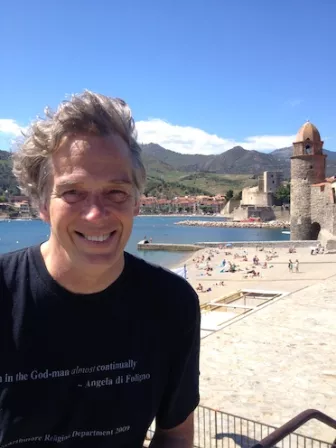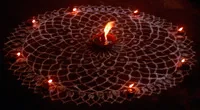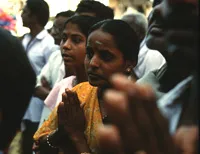Steven Hopkins
Mari S. Michener Professor of Religion and Asian Studies
Department Chair, Religion
Program Coordinator, Asian Studies
Religion
Contact
Affiliations: Global Studies, Islamic Studies, Medieval Studies, Interdisciplinary Programs, Asian Studies, Religion

Education and Background
After a B.A. in English Literature from the University of California, Santa Barbara in 1976, I remained in the Santa Barbara area, working in a coffee house and in restaurants, pursuing the writing of fiction and poetry, organizing poetry readings and co-hosting a poetry radio show at UCSB. Later, after meeting the theologian and philosopher of religion, Raimundo Panikkar, I returned to UCSB to pursue an M.A. in Religious Studies in 1981-82. After three years (1984-1987) at the Graduate Theological Union and UC Berkeley doing initial Ph.D. and language studies (Sanskrit and Patristic Greek), and working with Mark Juergensmeyer in Religious Studies, I shifted to the east coast and in 1995 I received my Ph.D. from Harvard University in the Comparative Study of Religion.
I first came to Swarthmore in 1993, and have been teaching here ever since. Along with my work as a scholar and translator of South Indian devotional poetry, I have published poetry in literary journals over the years, and a book of fiction, The Leaving: Three Stories, appeared in 1978, published by Mudborn Press, Santa Barbara, and received the Eisner Prize in Literature (for poetry) at UC Berkeley.
Research

My major academic field is South Indian devotional literature in Sanskrit and Tamil, with special attention to the work of a medieval (14th century) South Indian saint-poet Veṅkaṭanātha, best known by his honorific title Vedāntadeśika or "Preceptor of the Vedanta." Over the years I have received fellowships from the John Simon Guggenheim Foundation, the Fulbright Foundation, the National Endowment for the Humanities, the American Institute of Indian Studies, a Lang Fellowship and a George E. Becker Faculty Fellowship at Swarthmore College to begin and complete various projects focused on the work of this saint-poet. In the spring of 2010 I was awarded the South Asia Council of the Association for Asian Studies A.K. Ramanujan Book Prize for Translation for An Ornament for Jewels: Love Poems for the Lord of Gods (Oxford University Press, 2007). In addition to Singing the Body of God: The Hymns of Vedāntadeśika in Their South Indian Tradition (Oxford University Press, 2002), An Ornament for Jewels: Love Poems for the Lord of Gods by Vedāntadeśika (Oxford University Press, 2007), and The Flight of Love: Messenger Poem of Medieval South India (Oxford University Press, 2016), I have co-edited a book with John B. Carman entitled Tracing Common Themes: Comparative Courses in the Study of Religion (Scholars Press, 1990). I am currently at work on a long-term project on lament, with a focus on women's laments, in Greek, Sanskrit, and Tamil literatures. I have also developed a particular interest in the poetry, designs, and "prophecies" of William Blake, and have published on the theme of women's laments in Blake's prophetic books.

Important themes in my research on the poetry and poetics of Veṅkaṭanātha include the play of divine absence and presence in the world of religious emotions; the power of temple icons as the "living bodies" of the god; the exchange of eyes and human-divine contact, darśan, seeing and being seen by the god; the telescoping of time past and future in the eternal present of the religious lyric; love, human vulnerability and the impassible perfected body of god; the devotional experience of a "beauty that saves," and the paradoxical coexistence of asymmetry and intimacy of lover and beloved at the heart of the divine-human encounter.
I have traveled and done research in South India (primarily Tamil Nadu and Karnataka), and have also traveled in areas of North India, Sri Lanka, Japan, North and South Vietnam, and Cambodia.
Publications
Books

2016, The Flight of Love: A Messenger Poem of Medieval South India (New York: Oxford University Press, 2016).
2007, An Ornament for Jewels: Poems for the Lord of Gods by Vedāntadeśika (New York: Oxford University Press, 2007).Winner of the 2010 SAS AAS A.K. Ramanujan Prize for Translation. Available also on Oxford Scholarship Online.
2002, Singing the Body of God: The Hymns of Vedāntadeśika in Their South Indian Tradition (New York: Oxford University Press). Oxford Delhi edition, 2003. Available also on Oxford Scholarship Online.
1990, Editor, with John B. Carman, Tracing Common Themes: Comparative Courses in the Study of Religion. Atlanta, GA (Scholars Press)
Selected Articles, Reviews, Chapters in Books
2023, “Theology in Poetry: Divinity, Humanity, and the Natural World in Veṅkaṭanātha's Haṃsasandeśa,” in God or the Divine: Religious Transcendence Beyond Monism and Theism, Between Personality and Impersonality. Edited by Bernhard Nitsche and Marcus Schmücker. Berlin and Boston: De Gruyter, 2023: 385-411.
2021, “Lament and the Work of Tears: Andromache, Sītā, Yaśodharā,” in The Bloomsbury Research Handbook of Emotions in Classical Indian Philosophy, edited by Maria Heim, Ram-Prasad Chakravorthy, and Roy Tzohar, pp 107-130.
2016, "Bodies of Desire, Bodies of Lament: Marking Emotion in a South Indian Vaiṣṇava Messenger Poem," in Refiguring the Body: Embodiment in South Asian Religions, edited by Barbara A, Holdrege and Karen Pechilis. CRSI Publication Series. New York: State University of New York Press, pp. 229-252.
2014, "A Rich and Holy Bewilderment." A review article of Francis X. Clooney, His Hiding Place is Darkness: A Hindu-Catholic Theopoetics of Divine Absence. Series: Encountering Traditions. Stanford, CA: Stanford University Press, 2014, in The Journal of Vaiṣṇava Studies 22, No, 2 (Spring 2014), pp. 301-308.
2013, a review of David Shulman, More Than Real: A History of the Imagination in South India. Cambridge, MA: Harvard University Press, 2012, for the journal South Asian History and Culture, 4:3, pp. 424-426.
For longer version of review in Thuppahi's Blog, "Shulman's Exploration of the Imagination in the South Indian Cultural World" (http://thuppahi.wordpress.com/2013/08/17/10217/)
2011, "Patterns from Particularities." In Review: Books. Harvard
Divinity Bulletin ( Winter/Spring 2011), pp. 68-71.
2009, "Sanskrit in a Tamil Imaginary: Sandeśakāvya and the Haṃsasandeśa of Veṅkaṭanātha," in Passages: Relationships between Tamil and Sanskrit. Edited by Kannan M. and Jennifer Clare. Tamil Chair, DSSEAS, University of California, Berkeley and Institut Français d'Indologie, Publications Hors série n. 11: Pondichéry, South India: IFP, 2009, pp. 281-312.
2009, "'I walk weeping in pangs of a Mothers torment for her Children:' Women's Laments in the Poetry and Prophecies of William Blake," Journal of Religious Ethics 37: 1, pp. 31-81.
2007, "Extravagant Beholding: Love, Ideal Bodies, and Particularity," History of Religions, Vol. 47 No. 1 (August 2007), pp. 1-50.
2007, "At Play in the Forests of the Lord: The Gopālaviṃśati," in Krishna: A Sourcebook, ed. by Edwin Bryant. New York: Oxford University Press, 2007, pp. 285-306.
2004, "Lovers, Messengers, and Beloved Landscapes: Sandeśa Kāvya in Comparative Perspective." International Journal of Hindu Studies 8, 1-3 (2004), pp. 29-55.
2002, "Loving God in Three Languages: The Vedas of Vedāntadeśika," Journal of Vaiṣnava Studies, Vol. 10, No.2 (Spring 2002), pp. 51-79 (a special issue devoted to the work of John B. Carman).
1996, "Singing in Tongues: Poems for Viṣṇu by Vedāntadeśika," in The Journal of Vaiṣṇava Studies, Vol. IV, no.4 (Fall 1996), pp. 159-187.
1993, "In Love with the Body of God: Eros and the Praise of Icons in South Indian Devotion," in the Journal of Vaiṣṇava Studies, Vol. 2, No.1 (Winter 1993), pp. 17-54.
1985: "El símbolo, la palabra y el mito del pluralismo. Reflexiones sobre la metodología intercultural de R. Panikkar," in Anthropos. Revista de documentación científica de la cultura. N.53-54, Barcelona, Spain, pp.79-86.
Work in Progress (2021-2022):
Her Single Braid a Writhing Serpent: Lament, Particular Love, and the Work of Tears. A comparative study of lament, with specific focus on women’s ritual laments and their transformations in literature, from ancient and contemporary rural Greece, early Late Antique Christian literature, pre-modern (medieval) and contemporary Sanskrit and Tamil literatures of South India, to the poetry and prophecies of William Blake. Such a comparative focus on the theme of lament as a performative ritual and literary genre in a variety of comparative contexts provides me with a fresh vantage point from which to consider the function of women and women’s complaining voices as an ethical witness to social, sexual, individual, and institutional forms of violence and injustice, formulating what I call an ethics of witness and its destinies across cultures. Chapters will include close readings in the original languages of women’s laments in the Iliad and in selected plays of Euripides; David and Jonathan in the Hebrew Bible and the figure of Rachel in Lamentations Rabbah; Gregory of Nyssa’s Vita S. Macrinae; male and female laments in the Rāma and Sītā narratives of the northern and southern recensions of the Sanskrit Rāmāyaṇa and the Irāmāvatāram of 12th-century Tamil court poet Kampaṉ; Veṅkaṭeśa’s Haṃsasandeśa, and the poetry and prophecies of William Blake.
Course Themes
My classes at Swarthmore range widely, and are often comparative: I teach courses on the History, Religion, and Culture of India, with an emphasis on Hindu, Buddhist, Jain, and Islamic traditions; on Buddhist Traditions of Asia, along with a comparative course, "Patterns of Asian Religions," that touches upon South and East Asian traditions, including units on Confucian and Taoist traditions in China and Shinto and Zen Buddhist traditions in Japan. I also teach a comparative course on "The Power of Images" that includes materials from Roman Catholic and Eastern Orthodox Christian, Jewish, Hindu and Buddhist traditions, and a comparative seminar on "Love and Religion" that includes themes that bear not only upon medieval Sanskrit and Tamil devotional traditions of South India, the poetry of Kālidāsa and Bengali saint-poet Rampraśad, but also on the Hebrew and Greek Song of Songs and its Jewish and Christian commentaries, Plato's Symposium and Phaedrus, the work of Cappodocian Father Gregory of Nyssa, Dante and the Occitan troubadours, the love lyrics of the Sufi poet-philosopher Ibn 'Arabī, and the poetry and autocommentaries of San Juan de la Cruz. Other core courses include seminars on the poetry and prophecies of William Blake and "Poet, Saints, and Storytellers," a thematic survey of various South Asian religious literatures and their performance traditions in translation, from the Tamil and Sanskrit poems of medieval Hindu saints in the South, Hindi and Bengali poems from the North and Northeast, Sinhala narratives of the life of the Buddha from Sri Lanka, to mother's birthing songs in Rajasthan, Hindu women's folktales in Himachal Pradesh, and praises of the Prophet Muḥammad in Urdu, Sindi, and in the Tamil children's songs of the deep South.
Core Courses
- Buddhist Traditions of Asia
- Patterns of Asian Religions
- Hindu Traditions of India: Power, Love, Knowledge
- Muslim, Hindu, and Sikh in India
- Religion and Literature
- The Power of Images
- Partitions: Religions, Politics, and Gender in South Asia Through the Novel
Seminars
- Love and Religion
- Poets, Saints & Storytellers
- The Poetry and Prophecies of William Blake
First-year Seminar
- The Poetry of Religion



